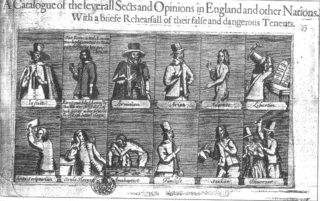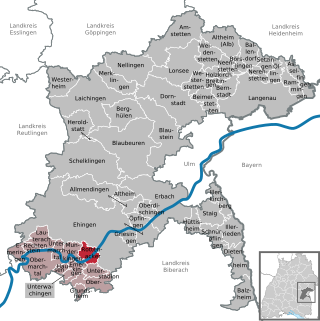
The Puritans were English Protestants in the 16th and 17th centuries who sought to purify the Church of England of Roman Catholic practices, maintaining that the Church of England had not been fully reformed and should become more Protestant. Puritanism played a significant role in English history, especially during the Protectorate.

Zoar is a village in Tuscarawas County, Ohio, United States. The population was 169 at the 2010 census. The community was founded in 1817 by Radical Pietists as a utopian Christian community, which survived until 1898.

In English church history, the Nonconformists, also known as a Free Church person, are Protestant Christians who did not "conform" to the governance and usages of the established church, the Church of England. Use of the term in England was precipitated after the Restoration of the Stuart monarchy in 1660, when the Act of Uniformity 1662 renewed opposition to reforms within the established church. By the late 19th century the term specifically included other Reformed Christians, plus the Baptists, Brethren, Methodists, and Quakers. The English Dissenters such as the Puritans who violated the Act of Uniformity 1559 – typically by practising radical, sometimes separatist, dissent – were retrospectively labelled as Nonconformists.

Congregational churches are Protestant churches in the Calvinist tradition practising congregationalist church governance, in which each congregation independently and autonomously runs its own affairs.
Separatism is the advocacy of cultural, ethnic, tribal, religious, racial, governmental or gender separation from the larger group. As with secession, separatism conventionally refers to full political separation. Groups simply seeking greater autonomy are not separatist as such. Some discourse settings equate separatism with religious segregation, racial segregation, or sex segregation, while other discourse settings take the broader view that separation by choice may serve useful purposes and is not the same as government-enforced segregation. There is some academic debate about this definition, and in particular how it relates to secessionism, as has been discussed online.

English Dissenters or English Separatists were Protestant Christians who separated from the Church of England in the 17th and 18th centuries.
Thomas Helwys, an English minister, was one of the joint founders, with John Smyth, of the General Baptist denomination. In the early seventeenth century, Helwys was principal formulator of demand that the church and the state be kept separate in matters of law, so that individuals might have a freedom of religious conscience. Helwys was an advocate of religious liberty at a time when to hold to such views could be dangerous. He died in prison as a consequence of the religious persecution of Protestant Dissenters under King James I.
The Interregnum was the period between the execution of Charles I on 30 January 1649 and the arrival of his son Charles II in London on 29 May 1660 which marked the start of the Restoration. During the Interregnum, England was under various forms of republican government.
The Brownists were a group of English Dissenters or early Separatists from the Church of England. They were named after Robert Browne, who was born at Tolethorpe Hall in Rutland, England, in the 1550s. A majority of the Separatists aboard the Mayflower in 1620 were Brownists, and indeed the Pilgrims were known into the 20th century as the Brownist Emigration.
In Welsh and English church history, Independents advocated local congregational control of religious and church matters, without any wider geographical hierarchy, either ecclesiastical or political. They were particularly prominent during the Wars of the Three Kingdoms as well under the Commonwealth and Protectorate. The New Model Army became the champion of Independent religious views and its members helped carry out Pride's Purge in December 1648.

John Robinson (1576–1625) was the pastor of the "Pilgrim Fathers" before they left on the Mayflower. He became one of the early leaders of the English Separatists, or Brownists, and is regarded as one of the founders of the Congregational Church.

Rottenacker is a village in the district of Alb-Donau in Baden-Württemberg in Germany.

The Puritan migration to New England was marked in its effects from 1620 to 1640, declining sharply afterwards. The term Great Migration usually refers to the migration in the period of English Puritans to Massachusetts and the Caribbean, especially Barbados. They came in family groups rather than as isolated individuals and were mainly motivated for freedom to practice their beliefs.
Christopher Lawne was an English merchant and Puritan of note, who was among the earliest settlers in the Virginia Colony in the early 17th century. Born in Blandford, Dorset, he emigrated on the Marygold in May 1618 and died in Virginia the following year.

From 1649 to 1660, Puritans in the Commonwealth of England were allied to the state power held by the military regime, headed by Lord Protector Oliver Cromwell until his death in 1658. They broke into numerous sects, of which the Presbyterian group comprised most of the clergy, but was deficient in political power since Cromwell's sympathies were with the Independents. During this period the term "Puritan" becomes largely moot, therefore, in British terms, though the situation in New England was very different. After the English Restoration the Savoy Conference and Uniformity Act 1662 and Great Ejection drove most of the Puritan ministers from the Church of England, and the outlines of the Puritan movement changed over a few decades into the collections of Presbyterian and Congregational churches, operating as they could as Dissenters under changing regimes.

In the early 17th century, thousands of English Puritans colonized North America, almost all in New England. Puritans were intensely devout members of the Church of England who believed that the Church of England was insufficiently reformed, retaining too much of its Roman Catholic doctrinal roots, and who therefore opposed royal ecclesiastical policy. Most Puritans were "non-separating Puritans" who did not advocate setting up separate congregations distinct from the Church of England; these were later called Nonconformists. A small minority of Puritans were "separating Puritans" who advocated setting up congregations outside the Church. The Pilgrims were a Separatist group, and they established the Plymouth Colony in 1620. Puritans went chiefly to New England, but small numbers went to other English colonies up and down the Atlantic.
Katherine Chidley was an English Puritan activist and controversialist. Initially involved in resistance to episcopal authority and in separatist activity in Shrewsbury and London, she emerged during the English Civil War as a powerful advocate of an Independent or Congregationalist polity. Under the Commonwealth of England and the Protectorate she was a leader of Leveller women, noted for her contribution to campaigns on behalf of John Lilburne.

Ecclesiastical separatism is the withdrawal of people and churches from Christian denominations, usually to form new denominations.
Dorothy Hazard was a seventeenth-century English religious reformer who played a part in the defence of the city of Bristol during the English Civil War. Despite her marriage to a Puritan minister, she founded a Dissenter church in Bristol, which became the city's first Baptist church, Broadmead Baptist Church.








